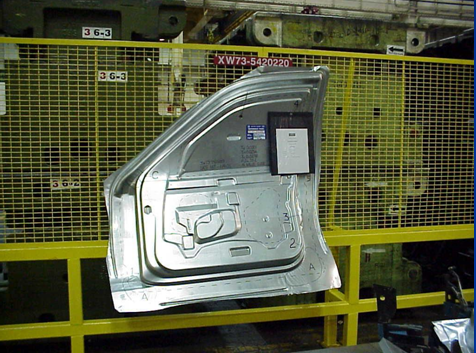The implementation of process control methods is still in the beginning stages within the traditional automotive stamping environment. Many stamping organizations struggle to maintain consistent processes and data collection systems.
The recent increase in usage of lightweight and high strength materials are proving to be a challenge for some stamping organizations as they try to maintain repeatable, consistent process and output conditions. Adhering to a consistent process will help in overcoming the losses associated with stamping these different materials. Identifying when and why a stamping process is flawed will help the organization identify the root cause of variation, a key step towards stabilization. This type of focus can also help drive the organization to continuous improvement and a process control mindset.
New process verification requirements are constantly being added by corporations to gain a better understanding of process control. The use of 3D scanning technology is one of the new requirements that is being utilized. This tool has the ability to collect die geometry data, allowing plant personnel to interpret the 3D geometric models created by the scanning equipment. This data is being used not only to capture changes due to die wear but also to map gauging, equalizer blocks, stop blocks and die geometry in case of damage to the tool while in production. Capturing this data when the job is running at an acceptable quality level will allow die managers the ability to reference back to the point of data collection and to be able to verify the die recipe has not changed.
The use of lubricant analyzers can also provide valuable information on lubricant weight, thickness and distribution. Measuring and documenting these parameters as received and after re-application at the press line will provide data for plant personnel to understand the impact of changing variables. Insufficient lubricant will cause an increase in material strains and can result in peak strain conditions resulting in unpredicted failure locations; too much lube will cause strains to decrease, but can cause print-through (pressure points observable on the final stamping), and difficulty in maintaining consistent draw-in. Higher strength materials are more susceptible to geometric changes (distortion) due to springback, so lubricant volume plays a greater role in part repeatability. Tight process controls and verification methods will need to be created and followed to ensure quality levels remain stable.

Process control improvements require time, money, work force, knowledge (acquired via training), equipment, and leadership. Creating solid control plans require input from those that are collecting the data; they must understand why the checks are being performed, and experience the benefit. This involvement will help increase the knowledge level of the team, and provide a sustainable environment for root cause analysis and problem solving. Organizational change can be one of the most difficult tasks for Operations Managers to perform. There will be pushback from both groups, supervision and hourly employees because most people are simply uncomfortable with change. Leading the charge for change will consume a great deal of time by plant managers, who need to be disciplined and consistent in their requirement for these new practices.
There are some short-term consequences to implementing process control improvements. For example, changes in organizational behaviors / practices may initially cause longer line transition times due to the addition of process verification. The long-term outcomes will net fewer adjustments and micro stops at the press line; freezing the process will all for a recipe to be developed and maintained, increasing uptime.
Setting up training for process control methods will require a capital investment on the organization’s behalf. Use of an internal or external source should be considered based on the expertise of both processes and materials. If you’re interested in implementing process control methods into your manufacturing plant contact The Phoenix Group today.
CASE STUDY: DRIVING IMPROVEMENT AT GENERAL MOTORS
Learn how The Phoenix Group leveraged process control methods to help a General Motors automotive manufacturing plant improve efficiency and reduce waste with manufacturing consulting services.


